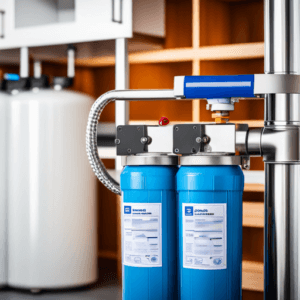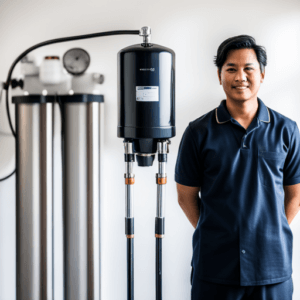Water is an essential element in our daily lives. However, tap water may contain impurities that can harm our health and home appliances, such as chlorine, sediments, bacteria, and heavy metals. This is where whole house water filters come into play.
Whole house water filters are installed at the main water line to filter all the incoming water before it reaches the faucets, showerheads, and appliances. They use a combination of physical and chemical processes to remove impurities from the water, ensuring clean and safe water for drinking, cleaning, and bathing.
In this article, we will answer the question: how do whole house water filters work and their benefits. We will also discuss the different types of filters available in the market.
What is a Whole House Water Filter?
A whole house water filter is a filtration system installed at the main water line of a house to provide filtered and clean water for all the faucets, showerheads, and appliances in the house. Unlike point-of-use filters, which are only connected to specific faucets or appliances, whole house water filters treat all the incoming water supply.
What Does a Whole House Water Filter Do?
A whole house water filter removes impurities from the water before it reaches any of the faucets or appliances in a house. It uses a combination of physical and chemical processes to clean the water, ensuring it is safe for drinking, cleaning, and bathing. All the water used in a household, whether for cooking, washing dishes, or taking a shower, will be filtered and free from contaminants.
How Do Whole House Water Filters Work?
Several stages are involved in filtering water with a whole house water filter. The exact steps may vary depending on the type of filter, but here is a general overview:
- Pre-filtration: The first stage involves removing large particles and sediments using a sediment pre-filter from the water. This helps to prevent clogging and extends the lifespan of the main filter.
- Main filtration: The water then passes through the main filter, which can be made of activated carbon, ceramic, or reverse osmosis membranes. These filters trap and remove impurities like chlorine, bacteria, heavy metals, and other contaminants from the water.
- Post-filtration: After passing through the main filter, the water may undergo another filtration stage to remove any remaining impurities. This ensures that the filtered water is safe and clean for consumption.
- Disinfection: Some whole house water filters include a UV light or ozone treatment stage to disinfect the water further and eliminate any remaining bacteria or viruses.

Overall, the process of filtering water with a whole house water filter ensures that all the water in a household is free from harmful contaminants, providing safe and clean water for all daily activities.
Do I Need a Whole-House Water Filter?
The need for a whole house water filter depends on the quality of your tap water and your personal preferences. If you live in an area with poor water quality or if you are concerned about potential health risks associated with tap water, then a whole house water filter may be a good investment.
Additionally, if you have sensitive skin or hair, using filtered water can help improve the health of your skin and hair by removing harsh chemicals and minerals that can cause irritation.
Which Contaminants Do Whole-House Water Filtration Systems Remove?
Whole house water filters are designed to remove many contaminants from the water supply. Some common impurities that whole house water filters can effectively remove include:
- Chlorine: This chemical is often added to tap water as a disinfectant, but it can cause an unpleasant taste and odor.
- Sediments: These are particles like sand, rust, and dirt that can clog pipes and damage appliances.
- Heavy metals: These include lead, mercury, and arsenic, which can be harmful if consumed at high levels.
- Bacteria and viruses: These microorganisms can cause illness if present in the water supply.
- VOCs (volatile organic compounds): These are chemicals found in pesticides, fertilizers, and other household products that can pose health risks.
- Pharmaceuticals: Trace amounts of medications have been found in tap water, which can be removed with proper filtration.
What Are the Different Types of Whole-House Water Filters?
There are various types of whole house water filters available on the market, each with its own unique features and benefits. Some common types include:

Sediment Water Filter
This type of filter is designed to remove large particles and sediments from the water supply. It typically uses a pre-filter followed by a main filter of materials like sand, gravel, or pleated paper.
Carbon Water Filter
Carbon water filters use activated carbon as the main filtering medium. Activated carbon is highly porous and has a large surface area, effectively trapping impurities like chlorine, VOCs, and other harmful chemicals.
KDF Water Filter
KDF (Kinetic Degradation Fluxion) filters use a combination of copper and zinc to filter out impurities like heavy metals, chlorine, and other contaminants. This type of filter is known for its long lifespan and effectiveness in removing bacteria and algae.
Activated Alumina Filter
Activated alumina filters mainly remove fluoride and arsenic from the water supply. This type of filter is made of aluminum oxide, which has a high affinity for these contaminants.
Alkalizing Water Filters
Alkalizing water filters use an ion exchange process to remove impurities from the water while adding minerals like calcium, magnesium, and potassium to create alkaline water. This type of filter is popular for its potential health benefits, such as improving digestion and boosting the immune system.
Reverse Osmosis Water Filter
Reverse osmosis (RO) water filters use a membrane to remove dissolved solids, impurities, and contaminants from the water supply. This type of filter is highly effective in removing minerals like lead, mercury, and arsenic.
Ultrafiltration Filter
Ultrafiltration filters use a membrane with tiny pores to physically block contaminants from passing through. This filter effectively removes bacteria, viruses, and other microorganisms from the water supply.
Iron Water Filter
Iron water filters are specifically designed to remove iron and manganese from the water supply, which can cause staining and a metallic taste.
UV Water Filter
UV water filters use ultraviolet light to disinfect and kill bacteria, viruses, and other microorganisms in the water supply. This type of filter is often used as a final step in whole house filtration systems for added protection against harmful pathogens.
How Do I Choose a Whole-House Water Filter?
When choosing a whole house water filter, it is important to consider your specific needs and tap water quality. Some factors to consider include:
- Water source: Is your water supply from a well or municipal system? This can affect the type of contaminants present in the water.
- Contaminants: Identify which impurities you want to remove from your water supply and choose a filter to effectively eliminate those contaminants.
- Filter lifespan: Different filters have different lifespans, so consider how often you must replace the filter or its cartridges.
- Water usage: Determine your household’s average daily water usage to ensure you choose an adequate flow rate filter.
- Budget: Whole house water filters can range in price from a few hundred dollars to thousands of dollars, so consider your budget and the long-term costs of maintaining the filter.
How Much Does a Whole House Water Purification System Cost?
The cost of a whole house water filtration system can vary greatly depending on the type of filter and its features. On average, a basic system can range from $500 to $1500, while more advanced systems with additional features like UV disinfection or alkalizing can cost upwards of $3000.
Additionally, some filters may require regular maintenance or replacement cartridges, which should also be factored into the cost. Overall, investing in a whole house water filtration system can provide long-term benefits for your health and the lifespan of your household appliances. So, carefully consider your options and choose a filter that best suits your needs and budget.
Advantages of Using Whole House Water Filters
Using a whole house water filter can provide numerous benefits for you and your household, including:
- Improved water quality: Whole house water filters effectively remove impurities and contaminants from tap water, providing clean and safe drinking water.
- Better health: Removing harmful chemicals and microorganisms from the water supply can help improve overall health and prevent illnesses.
- Longer lifespan for appliances: Filtering out impurities from the water can also protect your household appliances from damage, resulting in longer-lasting and more efficient performance.
- Cost-effective: While whole house water filters may require an initial investment, they can save you money in the long run by reducing the need for bottled water or frequent appliance repairs.
- Convenience: With a whole house water filter, you can have clean and safe water from any tap in your home, eliminating the need for individual filters on each faucet.

Disadvantages of Whole House Water Filters
While whole house water filters offer many advantages, there are also some potential drawbacks to consider, including:
- Initial cost: Installing a whole house water filtration system can be expensive, especially compared to purchasing a single faucet or pitcher filter.
- Maintenance: Some filters may require regular maintenance or replacement cartridges, which can add to the overall cost of owning a whole house filtration system.
Whole-House Water Filters: FAQs
How Frequently should I replace my whole house water filter?
The frequency of replacing a whole house water filter will depend on the type of filter and its lifespan. Following the manufacturer’s instructions for replacement or maintenance schedules is recommended.
Can a whole house water filter remove hardness?
Some whole house water filters are designed specifically to remove minerals responsible for hard water, such as iron and manganese. However, a dedicated softening system may be more effective if you have severe hard water.
Conclusion
In conclusion, whole house water filters offer a convenient and effective solution for improving tap water quality. With various types of filters available, it is important to carefully consider your specific needs and budget when choosing a filter. While some potential drawbacks exist, the benefits of using a whole house water filter far outweigh any initial costs or maintenance requirements.
Remember that regular maintenance and filter replacements are essential for ensuring optimal performance and clean water for your household. So, follow the manufacturer’s instructions and enjoy the many benefits of a whole house water filtration system.

